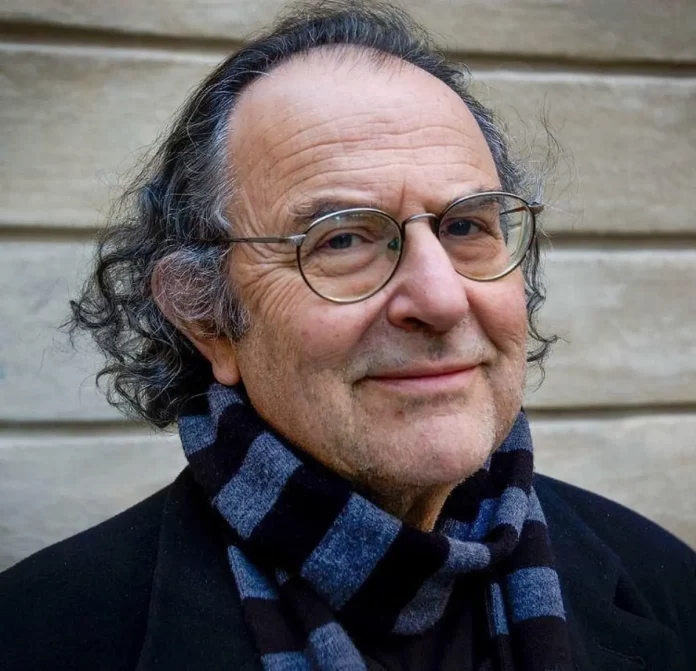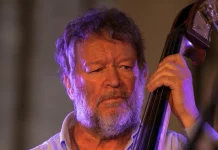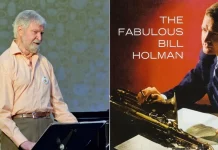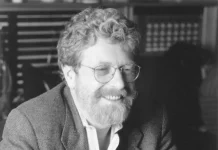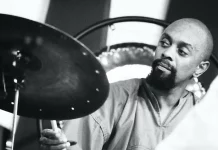Long acknowledged as one of Sweden’s finest jazz musicians and composers, Georg Riedel died in Stockholm on 25 February 2024, at the age of 90. He had been guest of honour at Ystad in 2021 and this year the Swedish festival had planned to celebrate him as its honorary ambassador, with a special concert by the Bohuslän Big Band and guests. Despite the great sadness occasioned by the legendary bassist’s passing, currently the concert is scheduled to go ahead.
Georg Riedel was born 8 January 1934 to a Sudetenland German father and a Czech Jewish mother, in Karlovy Vary, Czechoslovakia. In 1938 the family fled to Sweden following the German annexation of the Sudetenland. After school years and further studies in Stockholm, where he played violin and cello and was classically trained as a double-bass player, Riedel first participated in the burgeoning Swedish modernist jazz scene through his work in the groups of Putte Wickman (cl) and, especially, Lars Gulllin (bar).
Riedel worked with Gullin in the early to mid-1950s, appearing on such classic tracks as Late Date, Manchester Fog, Primula Veris and Danny’s Dream. He also joined the ensemble of Arne Domnérus (as, cl) and played with him from the 1950s through to the 1980s on a rich range of material. Overall, this was material which in substantial measure took the engaged listener well beyond the cliché of “Swedish cool jazz”: it was music typified, e.g., by the bop/avant garde Mobil (1965),the folk-limned Scandinavian Design (1973), the swinging, modern mainstream Live At The Pawnshop (1976) and the elegant Portrait Of Porter (1985) where Domnérus and Riedel were joined by Rune Gustafsson (g).
The multi-planed septet date that is Mobil remains a substantial achievement. There are two sectional, swinging but also shape-shifting and provocative side-long pieces: pianist Jan Johansson’s title track and Riedel’s Paroxysmer För Sju (Paroxysms for Seven). A decade later Riedel would feature on another striking genre-blending endeavour: his side-long Dialoger (Dialogues) opens the superb Reflexioner (Reflections) cut with, a.o., Domnérus, Bengt Hallberg (p), Claes Rosendahl (ts, af) and a wind quintet.
The final volume of Leonard Feather’s Encyclopedia Of Jazz (co-authored by Ira Gitler) cites Jimmy Blanton, Ray Brown and Paul Chambers as Riedel’s favourites on bass and draws attention to his compositions Dizzy (for Gillespie) and Kind Of Requiem (for Ellington). But Riedel is best known for his collaboration with Jan Johansson on the modally turned, distilled yet spacious and quietly mesmeric folk-rinsed Jazz På Svenska of the early to mid-1960s. He also appeared on the large-scale masterpiece that is trumpeter Bengt-Arne Wallin’s Old Folklore In Swedish Modern (1962). As Erik Kjellberg details in his Jan Johansson: A Visionary Swedish Musician, Riedel continued to work with Johansson in a stimulating range of contexts, before the pianist’s all too early death in a road accident in November 1968.
A recipient of The Lars Gullin Prize and appointed Master of Jazz by France’s Django d’Or Jury, Riedel was well known for his writing for the Astrid Lindgren repertoire. He also wrote music for various film adaptations of the work of Stig Dagerman (1923 -1954), the Swedish journalist and author prominent in the aftermath of World War Two. And Riedel had to his further credit numerous works for opera, ballet, poetry, musicals, films and choirs, string quartets and percussion ensembles.
Riedel’s early work with Lars Gullin included some sonorous tracks with the Moretone Singers, a 16-piece mixed choir (hear the 1954 Late Date and Lover Man). One of the most important aspects of Riedel’s subsequent development as a composer was his radical foregrounding and reshaping of the role and the sound of the voice in jazz, epitomised by his extraordinary Jazz Ballet (1963) and Riedaiglia (1967) – the title of the latter, which won the Prix Italia, an acronym of the names of Riedel and leading African-American choreographer Alvin Bailey.
In his sleeve note for Jazz Ballet, the American critic (and sometime editor of Downbeat) Don DeMichael characterised Riedel thus: “Georg Riedel is a rare breed. His musical expression has a unique accent, flavored with the atonality of Arnold Schoenberg, the impressionism of Maurice Ravel, the cross-rhythms of Africa, the modal jazz of John Coltrane, and the jazz abstraction of Lennie Tristano – with overtones of the serious writing of George Gershwin and the swing of Benny Goodman. But Georg Riedel’s music is no crazy quilt of others’ ideas, no pastiche, no – heaven forbid – Third Stream. It is primarily Georg Riedel music […] Riedel says, ‘I am not concerned about labels people stick to my music. I only want to create good music. It’s as simple as that.'”
DeMichael’s characterisation could have added the bedrock of the blues (a form to which Jan Johansson was also much drawn) plus the bop of Charlie Parker and the modal moods of Miles Davis. But DeMichael’s chief point holds: it is the personal manner in which the composer Riedel fashioned an organic melding of ostensibly disparate elements which marks him out, not just as a bassist blessed with a fully rounded sound – a melodic master, equally, of pizzicato and arco, spare root figures and subtle counterpoint, swinging triplet lines and ostinato vamps – but also one of the most questing composers in jazz.
Riedel was throughout his career a musician and a composer of consummate quality. Sample, e.g., his chamber music work of the 1980s with Jan Allan (t), Bengt Hallberg and the sextet that is the Uppsala Chamber Soloists, documented on the Trio Con Tromba four-CD boxed-set retrospective released by VAX Records in 2012. It’s interesting to note that in 1999 Swedish bassist Anders Jormin recorded Riedel’s Idas Sommarvisa (Ida’s Summer Song) on his wide-ranging solo Xieyl release for ECM, an album that has more than a touch of Riedel’s open-minded spirit to it.
I was lucky enough to catch Riedel twice in concert: once in 1978 at Norway’s Molde Jazz Festival, where he appeared in a fine sextet led by Arne Domnérus, and much later at the 2011 Ystad Sweden Jazz Festival, in another memorable concert. This featured Sarah Riedel (born 1982) on vocals, with Jan Allan (t), Joakim Milder (ts), Mattias Ståhl (vib) and Jacob Karlzon (p). If my memory serves me correctly, the contributions of Riedel’s daughter, an established jazz singer, included sensitive settings of the poetry of Tomas Tranströmer.
When leading Swedish pianist and Ystad festival director Jan Lundgren’s 2015 festival concert A Tribute To Jan Johansson was released, it was only natural that Georg Riedel should supply a short, insightful and laudatory sleeve note. Later, in the midst of the Covid lockdown period, Riedel and Lundgren came together for a quite superb Ystad duo concert, which I reviewed for JJ.
Fortunately, the live broadcast transmission of the event is still available to view. It offers an affecting close-up portrait of a peerless musician and sui generis composer, the poetics of whose work will most surely continue to resonate across the ages.
Georg Riedel, bassist and composer; born Karlovy Vary, Czechoslovakia, 8 January 1934; died Stockholm, 25 February 2024.

